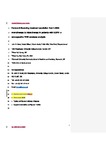Factors influencing treatment escalation from long-acting muscarinic antagonist monotherapy to triple therapy in patients with COPD: a retrospective THIN-database analysis
| dc.contributor.author | Hurst, JR | |
| dc.contributor.author | Dilleen, M | |
| dc.contributor.author | Morris, K | |
| dc.contributor.author | Hills, S | |
| dc.contributor.author | Emir, B | |
| dc.contributor.author | Jones, Rupert | |
| dc.date.accessioned | 2018-06-19T12:14:13Z | |
| dc.date.available | 2018-06-19T12:14:13Z | |
| dc.date.issued | 2018 | |
| dc.identifier.issn | 1178-2005 | |
| dc.identifier.issn | 1178-2005 | |
| dc.identifier.uri | http://hdl.handle.net/10026.1/11680 | |
| dc.description.abstract |
PURPOSE: Inappropriate use of an inhaled corticosteroid (ICS) for COPD has clinical and economic disadvantages. This retrospective analysis of The UK Health Improvement Network (THIN) database identified factors influencing treatment escalation (step-up) from a long-acting muscarinic antagonist (LAMA) to triple therapy (LAMA + long-acting β-agonist-ICS). Secondary objectives included time to step up from first LAMA prescription, Global Initiative for Chronic Obstructive Lung Disease (GOLD) grouping (2011/2013, 2017), and Medical Research Council (MRC) grade prior to treatment escalation. MATERIALS AND METHODS: Data were included from 14,866 people ≥35 years old with a COPD diagnosis (June 1, 2010-May 10, 2015) and initiated on LAMA monotherapy. The most commonly used LAMA at baseline was tiotropium (92%). RESULTS: Multivariate analysis (10,492 patients) revealed that COPD exacerbations, lower forced expiratory volume in 1 second (FEV1), "asthma", MRC grade, proactive and reactive COPD primary care, elective secondary-care contact, cough, and number of short-acting bronchodilator prescriptions were positively associated with treatment escalation (P<0.05). Being older, a current/ex-smoker, or having increased sputum symptom codes were negatively associated with treatment escalation (P<0.05). Median MRC score was 2 at baseline and 3 prior to treatment escalation. Using the last MRC reading and exacerbation history in the year prior to escalation, GOLD 2017 groupings were A 27.4%, B 37.3%, C 15.3%, and D 20%. In patients with available FEV1 measures, exacerbations, and MRC code (n=1,064), GOLD 2011/2013 groupings were A 20.4%, B 19.2%, C 24.8%, and D 35.6%. CONCLUSION: While the presence of COPD exacerbations seems to be the main driver for treatment escalation, according to the 2017 GOLD strategy many patients appear to be overtreated, as they would not be recommended for treatment escalation. Reviewing patients' treatment in the light of the new GOLD strategy has the potential to reduce inappropriate use of triple therapy. | |
| dc.format.extent | 781-792 | |
| dc.format.medium | Electronic-eCollection | |
| dc.language | en | |
| dc.language.iso | eng | |
| dc.publisher | Informa UK Limited | |
| dc.subject | inhaled corticosteroid | |
| dc.subject | treatment step-up | |
| dc.subject | GOLD 2017 grouping | |
| dc.subject | patient overtreatment | |
| dc.title | Factors influencing treatment escalation from long-acting muscarinic antagonist monotherapy to triple therapy in patients with COPD: a retrospective THIN-database analysis | |
| dc.type | journal-article | |
| dc.type | Journal Article | |
| dc.type | Research Support, Non-U.S. Gov't | |
| plymouth.author-url | https://www.webofscience.com/api/gateway?GWVersion=2&SrcApp=PARTNER_APP&SrcAuth=LinksAMR&KeyUT=WOS:000427379900001&DestLinkType=FullRecord&DestApp=ALL_WOS&UsrCustomerID=11bb513d99f797142bcfeffcc58ea008 | |
| plymouth.volume | Volume 13 | |
| plymouth.publication-status | Published online | |
| plymouth.journal | International Journal of Chronic Obstructive Pulmonary Disease | |
| dc.identifier.doi | 10.2147/copd.s153655 | |
| plymouth.organisational-group | /Plymouth | |
| plymouth.organisational-group | /Plymouth/Faculty of Health | |
| plymouth.organisational-group | /Plymouth/REF 2021 Researchers by UoA | |
| plymouth.organisational-group | /Plymouth/REF 2021 Researchers by UoA/UoA03 Allied Health Professions, Dentistry, Nursing and Pharmacy | |
| plymouth.organisational-group | /Plymouth/REF 2021 Researchers by UoA/UoA03 Allied Health Professions, Dentistry, Nursing and Pharmacy/UoA03 Allied Health Professions, Dentistry, Nursing and Pharmacy MANUAL | |
| plymouth.organisational-group | /Plymouth/Research Groups | |
| plymouth.organisational-group | /Plymouth/Research Groups/FoH - Community and Primary Care | |
| plymouth.organisational-group | /Plymouth/Research Groups/Institute of Health and Community | |
| plymouth.organisational-group | /Plymouth/Research Groups/Institute of Translational and Stratified Medicine (ITSMED) | |
| plymouth.organisational-group | /Plymouth/Research Groups/Institute of Translational and Stratified Medicine (ITSMED)/CCT&PS | |
| plymouth.organisational-group | /Plymouth/Users by role | |
| dc.publisher.place | New Zealand | |
| dc.identifier.eissn | 1178-2005 | |
| dc.rights.embargoperiod | Not known | |
| rioxxterms.versionofrecord | 10.2147/copd.s153655 | |
| rioxxterms.licenseref.uri | http://www.rioxx.net/licenses/all-rights-reserved | |
| rioxxterms.type | Journal Article/Review |


